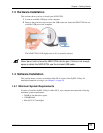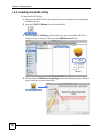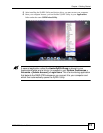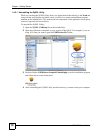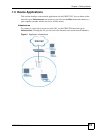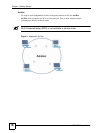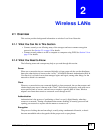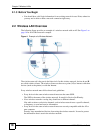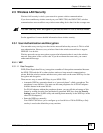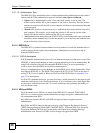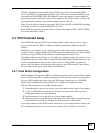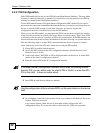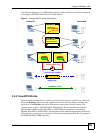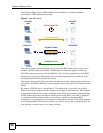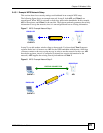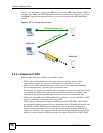
Chapter 2 Wireless LANs
NWD-270N User’s Guide
19
2.3 Wireless LAN Security
Wireless LAN security is vital to your network to protect wireless communications.
If you do not enable any wireless security on your NWD-270N, the NWD-270N’s wireless
communications are accessible to any wireless networking device that is in the coverage area.
" You can use only WEP encryption if you set the NWD-270N to Ad-hoc mode.
See the appendices for more detailed information about wireless security.
2.3.1 User Authentication and Encryption
You can make every user log in to the wireless network before they can use it. This is called
user authentication. However, every wireless client in the wireless network has to support
IEEE 802.1x to do this.
Wireless networks can use encryption to protect the information that is sent in the wireless
network. Encryption is like a secret code. If you do not know the secret code, you cannot
understand the message.
2.3.1.1 WEP
2.3.1.1.1 Data Encryption
WEP (Wired Equivalent Privacy) encryption scrambles all data packets transmitted between
the NWD-270N and the AP or other wireless stations to keep network communications
private. Both the wireless stations and the access points must use the same WEP key for data
encryption and decryption.
There are two ways to create WEP keys in your NWD-270N.
• Automatic WEP key generation based on a “password phrase” called a passphrase. The
passphrase is case sensitive. You must use the same passphrase for all WLAN adapters
with this feature in the same WLAN.
For WLAN adapters without the passphrase feature, you can still take advantage of this
feature by writing down the four automatically generated WEP keys from the Security
Settings screen of the ZyXEL utility and entering them manually as the WEP keys in the
other WLAN adapter(s).
• Enter the WEP keys manually.
Your NWD-270N allows you to configure up to four 64-bit or 128-bit WEP keys. Only
one key is used as the default key at any one time.



